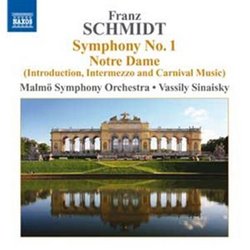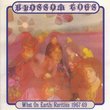| All Artists: Schmidt, Malmo Symphony Orchestra, Sinaisky Title: Schmidt: Symphony No. 1; Notre Dame Members Wishing: 0 Total Copies: 0 Label: Naxos Original Release Date: 1/1/2009 Re-Release Date: 3/31/2009 Genre: Classical Styles: Opera & Classical Vocal, Historical Periods, Modern, 20th, & 21st Century, Symphonies Number of Discs: 1 SwapaCD Credits: 1 UPC: 747313082872 |
Search - Schmidt, Malmo Symphony Orchestra, Sinaisky :: Schmidt: Symphony No. 1; Notre Dame
 | Schmidt, Malmo Symphony Orchestra, Sinaisky Schmidt: Symphony No. 1; Notre Dame Genre: Classical Franz Schmidt's finely crafted Symphony No. 1, grandiose in scale and optimistic in — mood, recalls the masterpieces of other great Romantic composers, Brahms, Bruckner — and Reger, and won the Beethoven Prize in 1900. His o... more » |
Larger Image |
CD DetailsSynopsis
Product Description Franz Schmidt's finely crafted Symphony No. 1, grandiose in scale and optimistic in mood, recalls the masterpieces of other great Romantic composers, Brahms, Bruckner and Reger, and won the Beethoven Prize in 1900. His opera Notre Dame, based on Victor Hugo's novel, was first staged in Vienna in 1914, and won him an international reputation. Under Vassily Sinaisky the Malmö Symphony Orchestra, whose other Naxos recordings have been highly praised, makes a strong case for the revival of Schmidt's strangely neglected, yet sumptuous and deeply satisfying music. Similar CDs
|
CD ReviewsEvocative, prismatic, and scintillating--late romanticism at Gregory M. Walz | Salt Lake City, Utah United States | 04/14/2009 (5 out of 5 stars) "The works of the Austrian composer Franz Schmidt (1874-1939) are almost never performed in the United States, or even outside of Austria. Although he only composed four symphonies (completed in 1899, 1913, 1928, and 1933), each possesses a delicate but sturdily evocative atmosphere and a supple prismatic orchestration, along with a scintillating rhythmic impulse. His Symphony No. 1 in E major, first performed in Vienna in 1902, established these hallmarks from the start. The first movement is gloriously flowing in tempo, with a well-modulated lyric sweep and finely etched rhythmic impetus. The second movement exudes a gentle and radiantly subdued prismatic pastoral, then briefly becomes more animated and at times decisively lyrical. The atmosphere is seamless here with radiant transitions. The third movement dances with a supple, dappled dash of rhythms and lightly swirling melodies. The textures are refined and intoxicating, especially in the strings and winds. The last movement is contoured with deeply rich, radiant perorations surrounded by lushly lyrical byways. The excerpts from Schmidt's first opera Notre Dame (composed 1902-1904) include the introduction, which is emphatically tuneful, with prismatic translucence tempered by transparent richness. The interlude has a supple yet searing richness of harmony, and the carnival music a wonderfully pliable shimmer to its textures and timbre. The recording has a strongly delineated, well-blended soundstage. The sound is clean and smooth, with just the right amount of atmosphere and resonance. The Malmo Symphony Orchestra's strings are refined yet full-bodied, while the brass resonate with no hint of coarseness. The overall sound of the orchestra is supple and gleaming, with an exuberant but finely calibrated organic richness. Vassily Sinaisky, the principal conductor of the Malmo Symphony Orchestra since 2007, animates the textures and balances, makes them smooth yet crisp, and glow with a pointed, gleaming warmth. He evokes a lithely grand, slowly evolving but ultimately gripping sense of architecture. This release is the first of a projected four volumes of Franz Schmidt with Sinaisky and the Malmo Symphony Orchestra on Naxos; the other three will include his second, third, and fourth symphonies. Based on this recording, Sinaisky and the orchestra's interpretations may turn out to be the most compelling and recommendable contribution to the discography of Schmidt's symphonies--in an unfortunately extremely limited field. Naxos has yet another winner here, and this release is strongly recommended to those with even the slightest interest in a uniquely rich, late romantic soundscape, yet one that is not overwhelming and saturated." Good Recording Hegelian | Concord, MA USA | 06/10/2010 (4 out of 5 stars) "This is not a really great symphony (the weakest of Schmidt's 4), but it's worth hearing once in a while, and these forces provide a good, enthusiastic performance. The orchestra's string tone is relatively thin (the Malmo's no Concertgebouw), so the work doesn't sound as lush as it might. Jarvi on Chandos remains a first choice, and Luisi is also worth considering. The hard-to-find Notre Dame music is a nice addition, though Karajan's intermezzo blows this one away."
|

![Feeling good [Single-CD]](https://nationalbookswap.com/cd//m/58/4458/394458.jpg)



